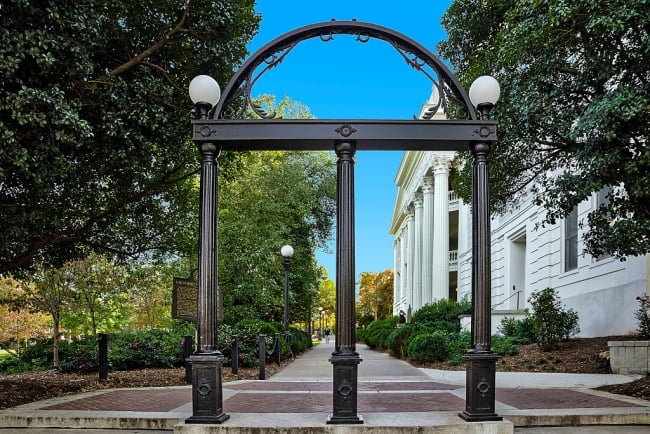You have /5 articles left.
Sign up for a free account or log in.

The University of Georgia is among the public, four-year institutions that proposed posttenure-review policy changes would affect.
The University System of Georgia, which oversees 26 institutions in that state, including all public four-year universities, landed on the American Association of University Professors’ censure list about a year ago for changes to its posttenure review policy.
Those changes had decoupled posttenure review from dismissal policies and their due process protections. Faculty members protested, but the system’s Board of Regents nonetheless carried out the changes.
Today, the board is set to consider more modifications to the relevant policies—but not ones that AAUP staff believe solve the fundamental issues with the prior alterations.
“I can say, having reviewed them, that I can’t imagine that [AAUP’s] Committee A on Academic Freedom and Tenure or the governing council would think that the removal of censure is facilitated by these changes,” said Mark Criley, a senior program officer in the AAUP’s Department of Academic Freedom, Tenure and Governance.
AAUP says it publishes its censure list “for the purpose of informing association members, the profession at large and the public that unsatisfactory conditions of academic freedom and tenure have been found to prevail at these institutions.”
Matthew Boedy, president of the Georgia Conference of the AAUP and a tenured associate professor at the University of North Georgia, said the system is attempting to get off the censure list with the changes.
“They twist themselves into pretzels trying to justify this revision, when clearly we all know what they’re trying to do,” Boedy said.
The system, the board chair and the board vice chair didn’t provide comment, beyond a spokesperson writing in an email, “Details on the proposed changes will be presented to the Board of Regents at [this] week’s meeting. Links for a webcast of the meeting will be posted online early [this] week.”
This week’s meeting agenda doesn’t mention trying to get off the censure list. Instead, the system includes these explanations for why it’s recommending that the board, among other things, add a faculty hearing back into the posttenure review policy:
While a final faculty hearing seems redundant for post-tenure review outcomes given the extensive steps already incorporated into the post-tenure review process, adding such a hearing would better align a separation of employment based on post-tenure review with a separation of employment based on other reasons. The recommendation is to allow an expeditious faculty hearing to evaluate due process, and one that is not binding on the president, at the final stage of the post-tenure review process. This would make policy 8.3.5.4 self-sufficient for separation of employment cases that are based on a post-tenure review.
That 8.3.5.4 is the posttenure review policy. But, Criley noted, this added “final faculty hearing” would, under the proposed changes, only be to “evaluate due process”—not the ostensible reason for dismissal.
He said the system was censured because its changes to posttenure review “removed a core element of academic due process for dismissal or major sanctions”—the opportunity for a faculty member to have a hearing before an elected faculty committee in which the administration bears the burden of demonstrating to that committee that the faculty member is professionally unfit for the position.
Criley noted the newly proposed changes would say “the faculty member has the right to request” the final faculty hearing, “so it’s not guaranteed, I suppose, that somebody would be afforded that hearing.”
He also noted that, even then, the hearing would be for “confirming that due process was followed. So this sounds like a kind of procedural review rather than a hearing that confronts the central question that I mentioned above, which is: Has the administration demonstrated adequate cause for dismissal?”
Without that, he said, “the system has, at best, tenure in name only. And, unfortunately, the proposed changes don’t remedy that situation, or appear not to.”
Another proposed change would be to the Discipline and Removal of Faculty Members policy, which is still separate from the posttenure-review policy.
It would change a line saying that professors can be fired for “Professional incompetency, neglect of duty or default of academic integrity in teaching, research or scholarship,” to instead say they could be fired for “Professional incompetency and neglect of duty that are not identified as part of the post-tenure review process, or default of academic integrity in teaching, research or scholarship.”
Criley noted that the change, “oddly,” would seem to mean that professors would have more job protections defending against “professional incompetency” identified outside of posttenure review than within posttenure review, because the former situation would mean they’re under the superior Discipline and Removal of Faculty Members policy.
Boedy called the proposals convoluted.
“They also have not, you know, consulted me on this policy revision, either,” he said. “So if this is an attempt to get off the censure list, it’s not a very good attempt, and it’s a confusing attempt. I’m not sure if I understand their own justification for this, and as a rhetoric professor, it’s a bit confusing.”
“Hopefully,” he said, “we can convince them to edit this before they would vote on it.”




